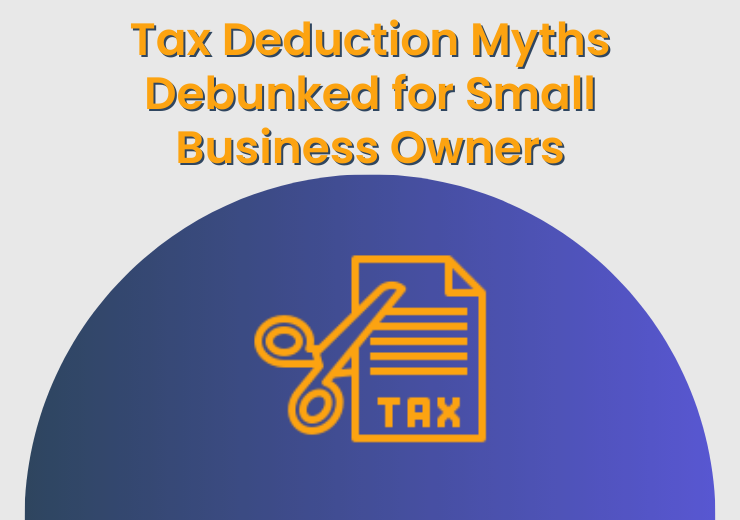Tax season can be a stressful time for small business owners, with the pressure of maximizing deductions while avoiding costly mistakes. Amidst the myriad of information available, there are several common myths surrounding tax deductions that can mislead entrepreneurs. In this article, we’ll debunk these myths and provide clarity on navigating tax deductions effectively.
Common Tax Deduction Myths
Myth 1: All business expenses are tax deductible.
It’s a common misconception that every expense incurred in running a business is automatically tax deductible. While many expenses are deductible, there are strict criteria that must be met. Expenses must be ordinary and necessary for the operation of the business to qualify for deduction.
Myth 2: Claiming a home office deduction triggers an audit.
Some small business owners shy away from claiming a home office deduction due to fear of triggering an audit. However, if the deduction is legitimate and meets IRS guidelines, there’s no reason to avoid it. Maintaining thorough records and ensuring eligibility can mitigate any potential audit risks.
Myth 3: Start-up costs are immediately deductible.
While start-up costs can be deducted, they must be amortized over time rather than deducted in full in the year they are incurred. Understanding the rules surrounding start-up expenses can prevent missteps and ensure compliance with tax regulations.
Myth 4: Claiming deductions increases the likelihood of an audit.
While it’s true that certain deductions may raise red flags, claiming legitimate deductions within the bounds of the law should not increase the risk of an audit. Accuracy and thorough documentation are key to substantiating deductions and avoiding scrutiny.
Debunking Tax Deduction Myths
Each of these myths stems from a misunderstanding or misinterpretation of tax laws. The reality is that while tax deductions can be complex, they are designed to benefit small business owners and incentivize entrepreneurship. By debunking these myths, we can empower entrepreneurs to make informed decisions and take full advantage of available deductions.
Maximizing Tax Deductions
To maximize tax deductions, small business owners should implement strategies such as:
- Keeping meticulous records of all business expenses.
- Utilizing accounting software to track deductions and expenses.
- Staying informed about changes to tax laws and regulations.
- Consulting with a tax professional to ensure compliance and identify opportunities for deductions.
By adopting these practices, entrepreneurs can minimize their tax liabilities and retain more of their hard-earned income.
Consulting a Tax Professional
While it’s possible to navigate tax deductions independently, seeking guidance from a tax professional can provide invaluable support. Tax professionals have the expertise to identify deductions specific to your business and ensure compliance with complex tax laws. Investing in professional advice can ultimately save time, money, and stress in the long run.
Conclusion
Navigating tax deductions as small business owners can be daunting, but separating fact from fiction is essential for financial success. By debunking common myths and understanding the intricacies of tax deductions, entrepreneurs can optimize their tax strategies and minimize liabilities. Remember, knowledge is power when it comes to tax deductions, so take the time to educate yourself and seek professional guidance when needed.
FAQs
-
Are all business expenses tax deductible?
- Not all business expenses are tax deductible. Expenses must meet specific criteria outlined by the IRS to qualify for deduction.
-
Does claiming deductions increase the risk of an audit?
- Claiming legitimate deductions within the bounds of the law should not increase the risk of an audit. Accurate record-keeping and compliance are key to avoiding scrutiny.
-
Can I deduct start-up costs immediately?
- Start-up costs must be amortized over time rather than deducted in full in the year they are incurred.
-
Should I be concerned about claiming a home office deduction?
- Claiming a legitimate home office deduction should not trigger an audit if it meets IRS guidelines and is supported by thorough documentation.
-
Why should I consult a tax professional?
- Tax professionals have the expertise to identify deductions specific to your business and ensure compliance with complex tax laws, ultimately saving time, money, and stress.

